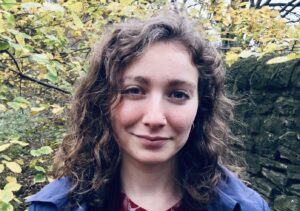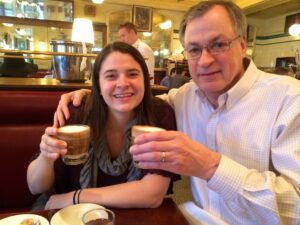Daddy, Did We Hurt Them? with Ben Yosua-Davis
In this episode of the Climate Changed podcast, you will experience:
- The Wall, a poem read by podcast guest Hannah Malcolm. It was written by David Benjamin Blower, a musician, writer, and podcaster. It comes from his 2019 album We Really Existed and We Really Did This, and it appears in the anthology, Words for a Dying World: Stories of Grief and Courage from the Global Church, edited by Hannah Malcolm.
- “Daddy, Did We Hurt Them?”, an audio essay written and voiced by co-host Ben Yosua-Davis and featuring his five year-old-son, Michael. Audio treatment by Peterson Toscano.
- Two conversations about the essay:
- Co-host Nicole Diroff and her father, Michael DiMonte
- Hannah Malcolm and co-host Nicole Diroff
- Next Steps for Engaged Hope
About Hannah Malcolm
 Hannah is an ordinand in the Church of England and is writing a PhD on a theology of climate and ecological grief. She is on the board of Operation Noah and regularly speaks and writes about climate justice and the church. She is the editor of Words for a Dying World: Stories of Grief and Courage from the Global Church (SCM Press, 2020).
Hannah is an ordinand in the Church of England and is writing a PhD on a theology of climate and ecological grief. She is on the board of Operation Noah and regularly speaks and writes about climate justice and the church. She is the editor of Words for a Dying World: Stories of Grief and Courage from the Global Church (SCM Press, 2020).
About Michael DiMonte

Michael DiMonte is a Christian, husband, father, and grandfather. He was raised Catholic, but has also attended Presbyterian, UCC, and United Methodist churches. He currently acts as a lay leader for the Working for Justice Ministry at St. Paul’s UMC near Pittsburgh, Pennsylvania.
While now retired, his professional career included working as an engineer, project manager, and executive in companies providing equipment to the electric power industry. He holds engineering degrees from Bucknell University and Purdue University, and a management degree from the Hartford Graduate Center.
Some Highlights from the Conversation
“My children are the ones who keep me grounded and teach me joy. That's important for me. I work in climate, and I love my job. But sometimes, I have to stare into the abyss.” — Ben Yosua-Davis
“We don't know how to deal with problems that simply cannot be fixed. We have no way of hoping in the face of problems that cannot be fixed. Because hope for us must always be an expression of power. ” — Ben Yosua-Davis
“Don't be afraid to talk to people who may see things very differently. We need to garner the courage to stick our necks out and engage people who see things differently.” — Michael DiMonte
“I found it very helpful to remember that in the Christian tradition, hope is a virtue, as much as it is a feeling that we can have that hope, like love is a virtue that, you know, you can't just have the virtue of hope by sort of wanting to be hopeful. You have to have the virtue of hope by practicing hopefulness; virtues come through the action of developing a habit.” — Hannah Malcolm
“There's quite a lot of danger in our grief becoming highly personalized. This kind of grief can make us nihilistic, it can make us selfish, it can make us behave in destructive ways, as well as compassionate ways. ” — Hannah Malcolm
Next Steps for Engaged Hope
- Michael DiMonte says:
- “Vote! We need personal change. We need family, we need community change. We need systemic change too.”
- “Don't be afraid to talk to people who may see things very differently. We need to garner the courage to stick our necks out and engage people who see things differently.”
- Hannah Malcolm says:
- “If you are a member of a religious community, whether Christian or otherwise, I think there's a couple of questions we can ask ourselves as we face up to what we're losing and what's coming ahead of us. And the first one is about this: how can my church community locally be a refuge for people in practical and spiritual ways? So how can we provide or facilitate support pastorally and spiritually for perhaps local climate activists, for young people, for those who are involved in local organizing, and then how can our building or our lands be a place of refuge, as people face increasingly precarious environments?“
- “What kinds of assets does that denomination or religious council have in terms of land, in terms of investments? Are those things aligned with what we say we believe in terms of the goodness of the earth, in terms of our duty to care for or attend to what God has made?”
- Ben Yosua-Davis says:
- “If you have a child in your life, you can find a way to talk to them about climate and our more than human community with them. Remembering that kids are capable of having much harder conversations than we adults give them credit for. Here are a couple places you could start: the next time you both see a bird, for instance, that catches your attention. Invite your child to imagine with you.”
- Nicole Diroff says:
- “As a way of connecting with all who are impacted, you could create a 72 hour emergency kit with a child in your life. In addition to the basics, you can customize it with suggestions from your child. These may include favorite snacks, games, books, and gifts to give to others. To learn more about 72 hour kits, visit ready.gov/kit.”
Climate Changed is a podcast about pursuing faith, life, and love in a climate-changed world. Hosted by Nicole Diroff and Ben Yosua-Davis, Climate Changed features guests who deepen the conversation while also stirring the waters. The Climate Changed podcast is a project of The BTS Center. The show is produced by Peterson Toscano.


